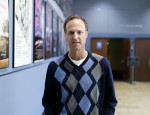Jon Fitzgerald directed a documentary about a group of American teenage girls who hiked to Machu Picchu as part of an empowerment program. Through the film, Fitzgerald said he shared their experiences in the hopes of inspiring all girls to become leaders.
Fitzgerald’s efforts to foster social progress through filmmaking is one of several topics that will be explored at the inaugural Spark Change Summit, presented by the Skoll Center for Social Impact Entertainment at the UCLA School of Theater, Film and Television on Friday at the James Bridges Theater. The event will feature three panel discussions regarding the distribution of impact films, the importance of storytelling on social change and the future of social impact entertainment, respectively.
Nicole Grunwald, program manager at the Skoll Center, said organizers of the summit are trying to create a forum for students and attendees to learn about the social impact of media directly from industry professionals.
“We’re really hoping to lay the groundwork of what that emerging field of social impact entertainment looks like,” Grunwald said. “It’s important to start there. How do we go forward; how do we create more of this type of content?”
Social impact entertainment refers to media that generates empathy and moves people to bring about positive action, Grunwald said. The spectrum of response can range from the behavioral change of a community to wider legislative action. The summit will address documentary and fiction films – the main pillars of the social impact industry – but also touch upon other media including music videos, theater and podcasts.
UCLA alumna Megha Kadakia will speak at one of the summit’s interactive sessions, entitled “Filmmaking for Change,” in which attendees will have the opportunity to speak with directors about their films and the social issues they address. Kadakia is the director of media production at Creative Visions, a company that supports professional social change producers and conducts hands-on media-making lessons for students. The company chose to support the summit to help inspire the next generation to take action, Kadakia said.
Kadakia’s past work as an independent film producer brought South Asian representation to the big screen. Her 2016 dramatic comedy, “The Tiger Hunter,” told the story of an Indian immigrant in 1970s America in an effort to highlight the immigrant perspective – a facet of the 1970s era that is often excluded from mainstream media, she said. At the summit, she will discuss her experience with underrepresented narratives as an important aspect of social impact entertainment.
“I have always wanted to showcase diverse voices,” Kadakia said. “The more we can shine a light on multiple experiences happening at the same time, the more we’re going to be able to understand the different perspectives (that shape) American culture.”
Fitzgerald will moderate and participate in the “Filmmaking for Change” conversation. He said he plans to cover a range of a topics about the industry, including distribution strategies and how young audiences today consume entertainment. With online streaming sites like Netflix, access to a multitude of content has never been more convenient, he said. He added his company Cause Cinema helps connect audiences with films and social impact campaigns that match their personal areas of interest through informational podcasts and blogs.
Fitzgerald’s experience directing “Warrior One” – the film about the excursion to Machu Picchu – taught him the significance of film in enacting empowerment. At the summit, he will discuss the concepts of social change filmmaking, and their application in real life situations, using the example of “Warrior One,” which illustrates the positive influence of the empowerment program on the teenage girls.
“(Warrior One) was demonstrating the broader message behind this movie in creating a toolkit,” Fitzgerald said. “We screened it for kids in schools … it really had an impact on the audience.”
Peter Bisanz, the executive director of the Skoll Center, will moderate the panel about defining social impact entertainment. Bisanz said the panel will delve into the relationship between filmmaking intent and subsequent change, such as the altering of global opinion on climate change and the reduction of personal prejudices surrounding religion. While measuring social impact entertainment can be complex, Bisanz said he remembers receiving a letter from a high school student in response to his film, “Beyond Our Differences.” The student said her view of the world had expanded after watching his film, which aimed to establish the commonalities between different cultural and religious communities from all over the world.
“I spent five years of my life making one film … it’s really hard to define the impact of it,” said Bisanz. “I think the thing that has resonated most with me was hearing from people who had their lives changed as a result of what’s created.”
Bisanz added he hopes attendees of the Spark Change Summit will leave with an appreciation for the usefulness of media as a tool to inform and evoke emotion in others for important issues.
“We want to create the kind of opportunities for people to have contact with social impact entertainment,” Bisanz said. “Where they realize their potential to help have a positive impact, to tell stories that change and shape our world.”
